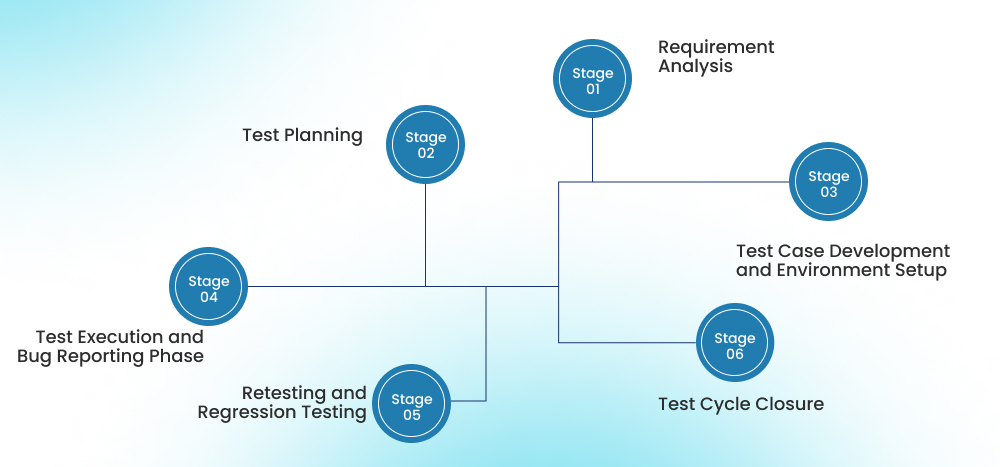QA in Modern Software Development: How Quality Assurance is Becoming a Key Difference Maker
Table Of Content
Published Date :
29 Oct 2024
The importance of Quality Assurance (QA) in software development cannot be overstated, even if some may downplay its importance from time to time. It plays a crucial role in streamlining the overall processes.
QA checks the functional and systematic development of software in every phase. It ensures that the software passes all checks before its release to the public in addition to verifying that the product meets the standards of design, development, testing, delivery, and client satisfaction.
Different companies hire proficient QA Analysts to perform top-notch QA analysis to assure the quality of the software. These firms perform crucial techniques like bug checking, reporting, and suggesting changes. Furthermore, they prepare test cases and document results.
Quality Assurance has become a major part of the software development lifecycle (SDLC). It follows a user-centric approach to ensure seamless integration of UI/UX design for enhanced customer satisfaction. This proves the need for QA in the market.
Now let’s deeply understand why QA is required in every sector.
Elevate Your Software Quality Today – Partner with Our QA Experts!
Why Quality Assurance is a Market Necessity
From Health Care, Retail, Banking, Govt, Technology, Automotive, to Education, every sector relies intently on QA.
Be it increasing demands in the automotive industry, where automakers must follow an active approach in testing their products to ensure safety and security of the customers; Or in Ed Tech where new technologies like Learning Management Systems( LMSs), Generative AI applications, performance tracking apps and many more keep popping up to help students build confidence and perform better in academics.
For all, adapting to QA terminologies becomes paramount to ensure easy accessibility and effectiveness. Industries can avoid financial and reputational losses by investing in prominent QA testing. Particularly, for e-commerce platforms, QA testing can ensure high traffic handling, and smooth user experience. For retail businesses, investing in QA testing is like building a competitive edge against competitors.
QA Processes: Ensuring Quality at Every Step

In essence, there are six stages of QA in the Software Development Life Cycle (SDLC).
Smart QA processes ensure seamless software development to fulfill the expectations of clients.
QA is a detail-oriented process that follows a systematic approach to ensure quality at each step. From requirement analysis to test planning, here is a comprehensive approach.
STAGE 1 – Requirement Analysis
Requirement analysis is the foundational phase of QA testing, where the project’s scope is assessed, and both functional and non-functional requirements of the software are defined. This stage focuses on gathering detailed information to guide testing, including establishing a requirement traceability matrix and identifying the necessary software and hardware to support the testing process.
STAGE 2 – Test Planning
In the second stage, a comprehensive test plan is created. This plan outlines the testing strategy, estimates project costs, and defines the testing objectives. It also specifies the tools and resources needed to execute the testing effectively, providing a structured approach to guide the team toward achieving project goals.
STAGE 3 – Test Case Development and Environment Setup
The third stage involves developing test cases, reviewing them, preparing necessary test data, and setting up an environment conducive to testing. This setup includes defining the optimal conditions required for accurate testing results. These processes ensure that the testing runs smoothly, laying the groundwork for reliable execution.
STAGE 4 - Test Execution and Bug Reporting Phase
In the fourth stage, the QA team moves forward with executing both manual and automated testing processes, carefully documenting the results along the way. During this phase, testers actively identify any defects or bugs, recording them as they arise. Quick logging and resolution of these issues are critical to maintaining project timelines and ensuring the stability of the software.
STAGE 5 - Retesting and Regression Testing
After bug fixes, the QA team conducts retesting to confirm that the software now functions as expected. They also carry out regression testing to ensure that recent updates haven’t affected other parts of the system. This dual approach ensures that both new and existing functionalities work together seamlessly, ultimately leading to a more reliable product.
STAGE 6 - Test Cycle Closure
The final stage is all about ensuring a smooth and dependable final product. This phase includes reviewing the entire testing process, generating comprehensive summary reports, and documenting insights to enhance the quality of future projects. This wrap-up stage offers valuable feedback that helps refine QA strategies, making the process more efficient for future cycles.
These phases are vital for covering every aspect of testing across various project stages and aligning with different Software Development Life Cycle (SDLC) methodologies. By meticulously following these steps, an agile QA team can better understand the project’s workflow and document its progress effectively.
Ensure Reliability and Performance – Get Started with Our QA Solutions!
The Role of Automation in Modern QA
Automation testing stands as a highly efficient, cost-saving solution, serving as a powerful asset in today’s fast-paced tech landscape. With growing demand for rapid delivery and reliable results, automation provides companies with a strategic edge, enhancing both speed and quality.
Automated testing empowers teams to run thousands of detailed test cases, expanding test coverage and uncovering potential issues that might be missed otherwise. This approach also reduces the likelihood of human error, driving accuracy across the board.
Organizations often rely on various testing frameworks to support automation, including keyword-driven frameworks, data-driven frameworks, linear automation frameworks, and modular-based testing frameworks. Each framework offers unique strengths, allowing companies to select the best approach based on project requirements and testing goals.
DITS is a leading software testing services company using Cypress and Selenium to meet the market needs. DITS follows comprehensive automation testing to automate time-consuming manual testing processes. It also removes repetition in the testing process as well.
Automation testing improves the execution process and automatically executes test cases using test scripts. These scripts can mimic keystrokes, data entry, and navigating between displays as well as other user interactions with the software. This advances the results of testing.
Future Trends: The Expanding QA Market

The QA market will see immense growth in the coming years. The increase in digital tech will boost businesses in various sectors. QA testing ensures accuracy, improves efficiency, drives accessibility and automates repetitive tasks.
QA testing plays an important role in ensuring the tech effectiveness for all users. It streamlines operations, and enhances the customer experience by making it smooth and efficient. Hence, companies will require QA in high demands in the coming time period.
Conclusion
In the end, QA plays a significant role in the IT industry. It ensures seamless user interface, satisfactory customer experience, enhanced operations and advanced optimization. It increases the brand reputation and builds trust by making the e-commerce platforms error-free and smooth.
With DITS innovative QA testing team, you can ensure smart and smooth qa software testing services. It is a leading firm that drives top-tier business solutions for customer satisfaction. Looking for a smart software testing service? Get in touch now!

Dinesh Thakur
21+ years of IT software development experience in different domains like Business Automation, Healthcare, Retail, Workflow automation, Transportation and logistics, Compliance, Risk Mitigation, POS, etc. Hands-on experience in dealing with overseas clients and providing them with an apt solution to their business needs.
Recent Posts

Explore predictive maintenance software features that reduce downtime, cut costs, and boost efficiency with enterprise-grade, AI-powered maintenance systems.

Benefits of AI in real estate include better cash flow planning, improved marketing ROI, stronger pipeline visibility, and scalable growth.

We at DITS offer custom Population Health Management Software Solutions to help you measure the effectiveness and efficiency of care delivery to patients. Read our blog to know in detail.